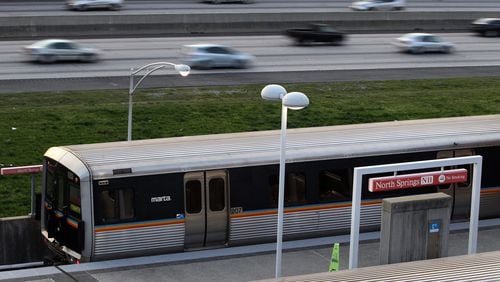Long ago, my fellow Gwinnett voters treated the idea of letting MARTA into the county a bit like suggesting someone put a fire ant on our dinner plate.
Gwinnett chairman Charlotte Nash has a clear memory of this.
But now Nash says she will push for a new public referendum on transit — though she said she doesn't know if it would include MARTA, which she thinks would have "precarious" chances with voters.
She said her timing wasn't sparked by the recent announcement that another big company (packaging maker WestRock) is pulling jobs of the county and moving 800 employees closer to a MARTA station.
But make no mistake, those two news events have something in common.
Traffic is driving us bonkers. At the same time, mass transit and perceptions that many millennial employees want to live intown are swaying decisions about where jobs and people go.
As a burbie myself, living far from significant mass transit, I don’t think the shift in attitudes will kill suburban growth. But it might limit increases in property values and curtail job choices in Gwinnett, Cobb, far north Fulton and other areas without many alternatives to driving.
Gwinnett is home to four Fortune 500 corporations. WestRock is the second to announce it’s moving to another part of the metro area.
(The other is Duluth-based NCR, which is building an HQ near Georgia Tech's campus, with expanded plans now for 5,400 employees in a spot that has become hot for tech hires. It's also near a MARTA rail station.)
WestRock, which used to be called Rock-Tenn, has $14.2 billion in annual sales and roots to a local family-owned business. It recently announced it needs more space than it has in Norcross and will move to an office tower in Sandy Springs.
The location is more central to where employees live, spokesman Chris Augustine told me. And it’s an easier commute for many newer employees who live intown.
Yeah, it’s another Atlanta suburb. But one with a straight shot on MARTA trains to the Atlanta airport, a fact that Norcross Mayor Bucky Johnson said WestRock’s CEO stressed to him when he broke the news.
“You can’t be everything to everybody,” Johnson told me.
Mixed transit
He’s a transit supporter, though. Rather than adding a line or two of heavy rail, he muses that Gwinnett might be better served – and attract more employers — with a mix of rapid-transit buses and light rail covering more ground.
By some measures, Norcross already has the kind of selling points that some suburbs covet.
Employees at WestRock’s home base stroll to restaurants in the city’s quaint downtown. Four non-MARTA bus routes run through the city. A busy playground sits in the center of town and homes with front porches and fluttering flags are within walking distance. It’s authentic mixed use development.
But it wasn’t enough to keep WestRock, and that’s a problem.
I checked with the other two Fortune 500 companies in Gwinnett, AGCO and Asbury Automotive. Both say they have no plans to leave.
Of course, it wouldn’t make much sense to build expensive transit deeper into the suburbs just to keep a couple big companies happy.
But plenty of other business executives — including those at small and mid-size firms — also are showing renewed interest in either intown locations or ones that offer quick links to intown. So are some residents who have tired of nasty commutes.
Nash, the Gwinnett chairman, said when it comes to transit — whether its some kind of rail or juiced-up buses with dedicated lanes — she’s thinking of the mobility of Gwinnett residents first. But ultimately she’s considering jobs as well.
“This is an initiative that’s important to Gwinnett County for lots of reasons,” she said.
Alfie Meek was Gwinnett’s county economist before becoming director of Georgia Tech’s Center for Economic Development Research. He still lives far outside I-285 and keeps shifting his commuting schedule to adjust for worsening traffic.
“The lack of transportation options will continue to be an issue for the suburbs as population increases,” he said.
Better schools
That doesn’t mean the suburbs will stop growing. Not even close. They have the reputation of better schools, more affordable homes, quiet neighborhoods, more parks and less crime, all of which can draw newcomers, including millennials.
Gwinnett will add more new residents than any other local county by 2040, according to the Atlanta Regional Commission. It's also expected to get more jobs in construction and retail than others.
But Fulton County — a mix of urban and suburban, plus MARTA — is pegged for the biggest job gains locally. And it’s projected to do particularly well in choice job sectors, including professional and technical, healthcare and social assistance, management, finance and insurance.
Leah Scott, a math teacher with two kids in college, is making the exact opposite shift that some employers are contemplating. She and her husband moved from intown Atlanta to Norcross where they’d be closer to his work.
Not jumping into MARTA long ago was a mistake, she told me. “I think that was a lack of vision on the county’s part. I love Gwinnett County, but I think they blew it. I think Cobb blew it.”
Now, she said, “They have to look for new ways to attract younger workers.”
WestRock’s spokesman had told me that, “We like every other company, take into account not just where we are today, but where we expect to be in the future.”
That’s good. Maybe the future isn’t MARTA. Maybe self-driving cars will change our terrain.
But whatever we do, let’s show a little vision when we make our next moves.
Related coverage:
Find Matt on Facebook (https://www.facebook.com/mattkempnercolumnist) and Twitter (@MattKempner) or email him at mkempner@ajc.com.
Other Kempner's Unofficial Business columns: http://www.myajc.com/news/opinion/matt-kempner-unofficial-business/j9F7R2mOGomS5FMjfhho2O/
About the Author







